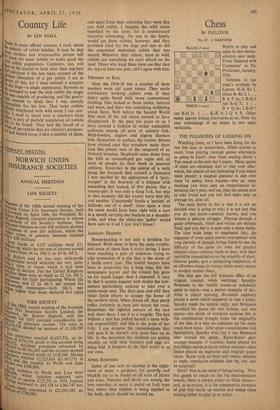Chess
By PHILIDOR No. 47. .1. HARTONG •
BLACK (5 men) WHITE ('I men)
WHITE to play and mate in two moves: solution next week. From 'Selected with Comments' in The Problemist, January, 1956.
THE PLEASURES OF LOOKING ON Watching chess, as I have been doing for the last few days at Amsterdam, differs almost as much from playing through games afterwards as going to Lord's does from reading about a Test match in the next day's paper. Marty games of chess are extremely dull to play over after- wards, but almost all are interesting if you watch them played; a magical glamour is cast over them by seeing them happen—you go away thinking you have seen an exceptionally in- teresting day's play, and yet, play the games over in cold blood and you will find than only an average lot, after all. The main factor in this is that it is not yet decided who is going to win; it is not just that you do not know—nobody knows, and you witness a genuine struggle. Playing through a game afterwards, victor and victim are already fixed, and you feel it is now only a sham battle. The time scale helps to emphasise this; the sequence of some quick moves interspersed with long periods of thought brings home to one the difficulty of the game for even the greatest players—chess columns (such as this), with their inevitable concentration on the minority of short, clearcut games, give a misleading impression of an effortless sweep to victory which rarely occurs in modern master chess.
One also gets the full dramatic effect of an original concept when watching: Spassky- Bronstein in the twelfth round—a wonderful game to watch—was a perfect example of this. After a placid opening, Bronstein suddenly played a move which appeared to lose a piece; Spassky made the natural reply, and Bronstein sacrificed his queen for two bishops and two pawns—the shock of complete surprise felt at this combination brought home the originality of the idea in a way no comment on the score could have done. After great complications and fluctuations, Spassky won; but it was Bronstein who created the game. Keres-Szabo gave another example of surprise; Keres played his first fifteen moves in about twenty minutes—then Szabo played an ingenious and original queen move. Keres took an hour and twenty minutes to reply: conclusive evidence that he, too, can be surprised! Slow? Not in the sense of being boring. With five games to watch on the big demonstration boards, there is always plenty to think about— and, as in'cricket, it is the comparative slowness of play that builds up tension and makes chess exciting either to play or to witch.










































 Previous page
Previous page